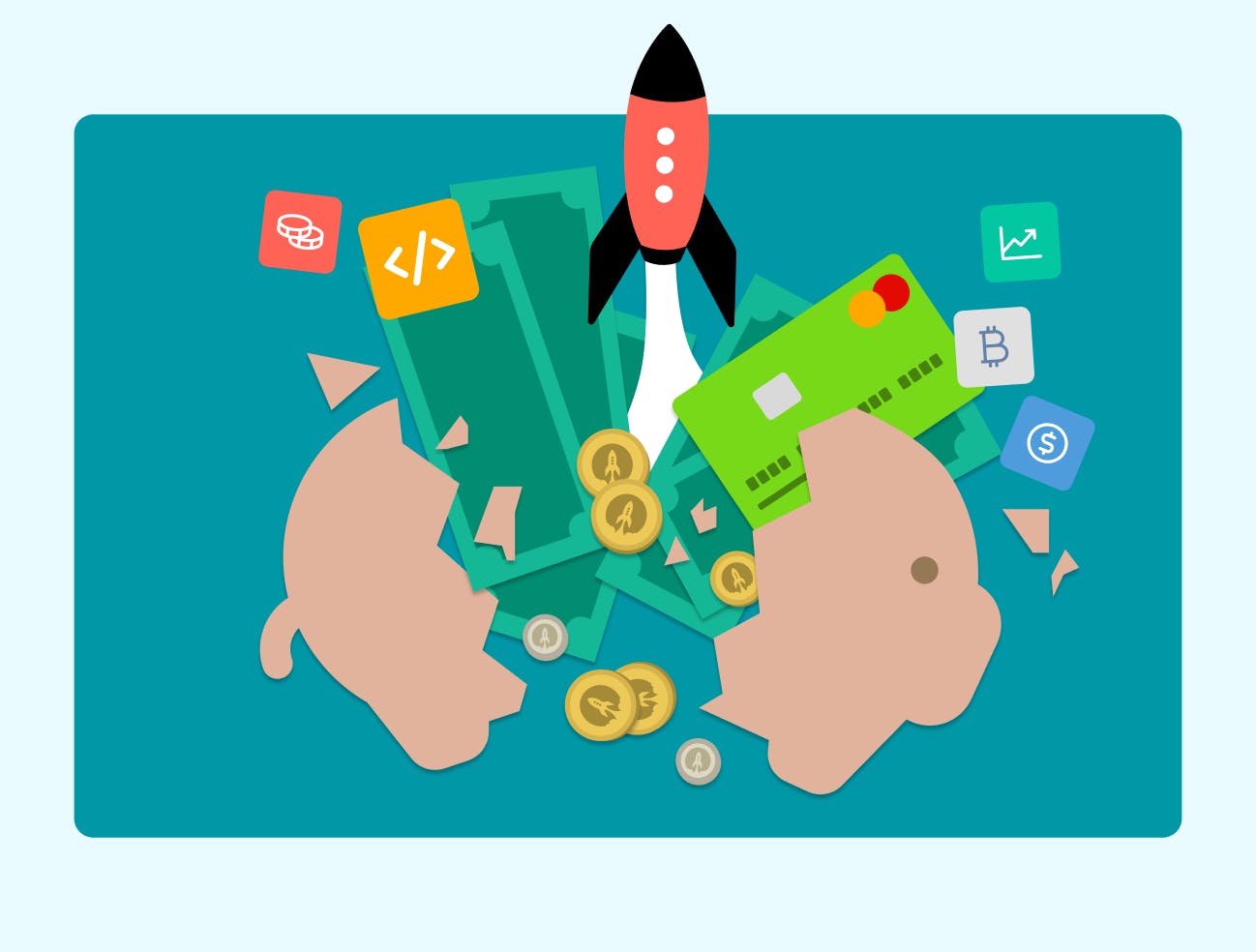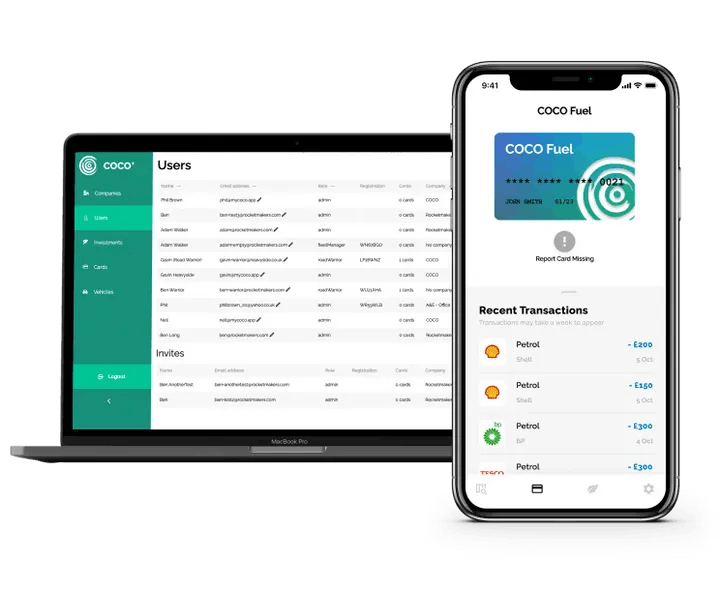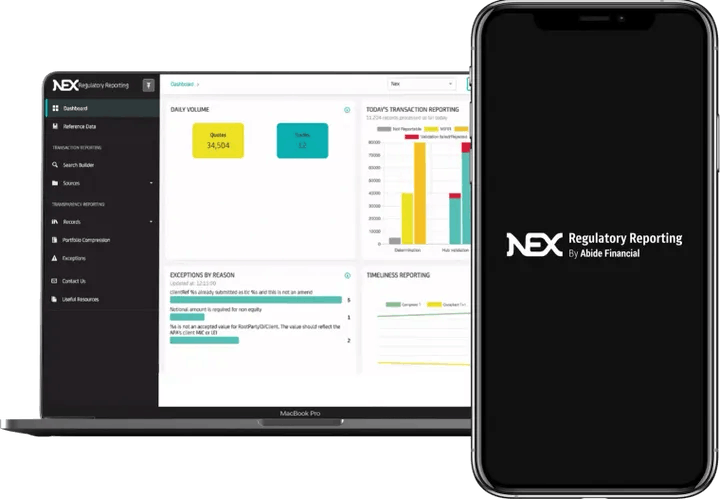
Fintech scaleup Seccl needed a new user interface to compliment its hyper-efficient backend infrastructure.

Build Brilliant Fintech with Rocketmakers
In 2023, global fintech investments surpassed $200 billion, according to CB Insights State of Fintech 2023 Report. As consumer preferences lean toward cashless payments, decentralised finance, and with AI-driven banking experiences becoming more commonplace, the need for secure, agile, and scalable fintech has never been greater.
At Rocketmakers, we've been empowering businesses with innovative financial solutions for over 17 years, and we've worked with some large corporations, like KPMG and Bank of America, as well as scale-ups like Seccl and start ups like TipTap. From apps to user interfaces, to finance reporting tools and problem-solving software, we have an array of experiences across the sector.
Let’s explore how better software can elevate your fintech business.

FinTech, short for financial technology, refers to the innovative use of technology to improve and automate financial services. It spans a wide range of applications, from online banking and mobile payment apps to blockchain-based cryptocurrencies.
FinTech solutions aim to make financial processes more accessible, secure, and efficient. For instance, mobile banking allows users to manage their accounts and transactions remotely, while digital wallets enable instant payments without the need for physical cash or cards.
Moreover, FinTech is playing a key role in financial inclusion, offering services to individuals and businesses who might not have access to traditional banking systems. It also encompasses technologies that enhance security, such as biometric authentication and encryption, ensuring safer financial interactions.
In short, FinTech is transforming how we manage money, from everyday transactions to complex investments, making the financial landscape more efficient, secure, and convenient for users.

The financial technology (fintech) sector is experiencing unparalleled growth, fundamentally reshaping the way individuals and businesses manage money. Fintech isn't just about creating digital solutions; it’s about transforming the entire financial landscape, making it more inclusive, efficient, and innovative.
In 2023, the global fintech market was valued at around $194 billion, and this is only set to rise. Projections suggest it could exceed $492 billion by 2028. The sector’s rapid growth offers significant opportunities for those looking to innovate within the financial space.
Here’s why building a fintech product is a smart choice:
💳 Digital-first consumers: Today’s consumers demand more convenient, faster, and secure ways to handle their finances. Traditional banking is evolving, with fintech providing on-demand solutions that cater to the needs of the digital age. By embracing fintech, you’re creating services that modern consumers expect.
💳 Financial inclusion: Fintech has the power to bridge the gap for underserved populations. Globally, more than 1.4 billion adults remain unbanked, according to the World Bank. Fintech solutions, such as mobile payments and peer-to-peer lending, are bringing financial services to people who previously had little to no access.
💳 Cost efficiency and automation: Businesses adopting fintech solutions benefit from reduced transaction costs, streamlined operations, and greater efficiency through automation. This translates into cost savings for both companies and consumers, making fintech products attractive across industries.
💳 Regulatory evolution: Governments worldwide are recognising the importance of fintech in driving economic growth. With regulatory frameworks like open banking and the UK's Fintech Sector Strategy, companies developing fintech solutions can benefit from regulatory support, increased transparency, and data-sharing initiatives that enable innovation.
💳 Data-driven decision-making: Fintech leverages advanced data analytics, artificial intelligence, and machine learning to offer personalised financial products and services. This allows businesses to make smarter decisions, manage risks more effectively, and deliver tailored solutions that enhance customer experience.
💳 Investment and funding opportunities: The fintech sector continues to attract enormous interest from investors. In 2022, global investment in fintech reached nearly $225 billion. With venture capital firms, private equity, and institutional investors all seeking to capitalise on the fintech revolution, there are abundant opportunities for securing funding and scaling your business.
In a world that is rapidly moving towards digital and cashless economies, fintech is not just the future—it’s the present. By building a fintech product, you’re contributing to an evolving ecosystem that is redefining the future of finance, creating more accessible, efficient, and innovative solutions for everyone.

Fintech scaleup Seccl needed a new user interface to compliment its hyper-efficient backend infrastructure.

Creating an app for “Big Four” accountancy firm KPMG

Bank of America asked us to identify the cause of a failing banking platform.

For TipTap we branded, designed and built an app for ethical tipping.

We built an MVP app for the COCO+ fuel card which helps users locate participating fuel stations and tracks the carbon offsets the users produce.

We created a finance reporting tool for Abide Financial - the market leader in global regulatory reporting solutions.
The financial technology (fintech) industry is evolving at a rapid pace, with emerging technologies continuing to transform how individuals and businesses manage their finances. Below is an overview of key trends expected to make waves in 2025:
🔸 Decentralised finance (DeFi): DeFi will continue to disrupt traditional banking models by offering decentralised financial services, enabling users to lend, borrow, and trade assets directly without intermediaries.
🔸 AI-driven financial services: Artificial intelligence will play a larger role in the fintech space, powering robo-advisors, automated customer support, and AI-driven investment strategies that personalise financial planning.
🔸 Blockchain innovation: Beyond cryptocurrencies, blockchain will find wider applications in areas such as supply chain finance, cross-border payments, and smart contracts, making transactions more secure and transparent.
🔸 RegTech (regulatory technology): As regulatory frameworks evolve, the need for advanced RegTech solutions will grow, helping financial institutions comply with regulations more efficiently while mitigating risks.
🔸 Embedded finance: The integration of financial services directly into non-financial platforms, such as e-commerce and social media, will allow users to seamlessly access payment solutions, loans, and insurance products without leaving the platform.
🔸 Digital wallets: The use of digital wallets will continue to expand, facilitating contactless payments, peer-to-peer transfers, and integrated financial management tools that give users more control over their spending and investments.
🔸 Cybersecurity advancements: With the growing reliance on digital banking and transactions, cybersecurity will remain a critical focus. Expect increased use of advanced encryption, biometrics, and AI-driven security solutions to protect against fraud and cyberattacks.
🔸 Sustainability in fintech: Green finance is set to grow, with fintech companies increasingly offering sustainable investment options and climate-friendly financial products, such as carbon-offsetting payment solutions.
🔸 Open banking: Open banking will continue to transform how financial services are accessed, enabling consumers to securely share their banking data with third-party providers, fostering innovation in personalised financial products.
🔸 Financial inclusion: Fintech solutions will increasingly focus on serving underbanked populations, offering affordable and accessible financial services, including microloans, remittance services, and mobile banking.
🔸 BNPL (Buy Now, Pay Later): The BNPL trend will continue to reshape the retail and e-commerce landscape, offering consumers flexible payment options, while driving innovation in credit scoring and risk assessment.
🔸 Crypto and digital currencies: As central bank digital currencies (CBDCs) and stablecoins gain traction, their integration into everyday financial systems will redefine how digital assets are used for payments, savings, and investment.
These trends will shape the future of financial technology, enhancing financial services for individuals and businesses while improving access, security, and convenience across the global financial ecosystem.
At Rocketmakers, we've spent the last 17 years helping businesses shape the future of financial technology. Part of our mission is to assist companies in building innovative fintech solutions. For our clients, it’s about creating cutting-edge financial products that redefine the industry.
Whether you're launching a new fintech venture or enhancing an existing project, our expert team is ready to bring your vision to life. Don’t just keep up with the rapidly evolving fintech landscape—lead the way with us.
Get in touch to discover how we can help your fintech company reach new heights!

Fintech Blogs